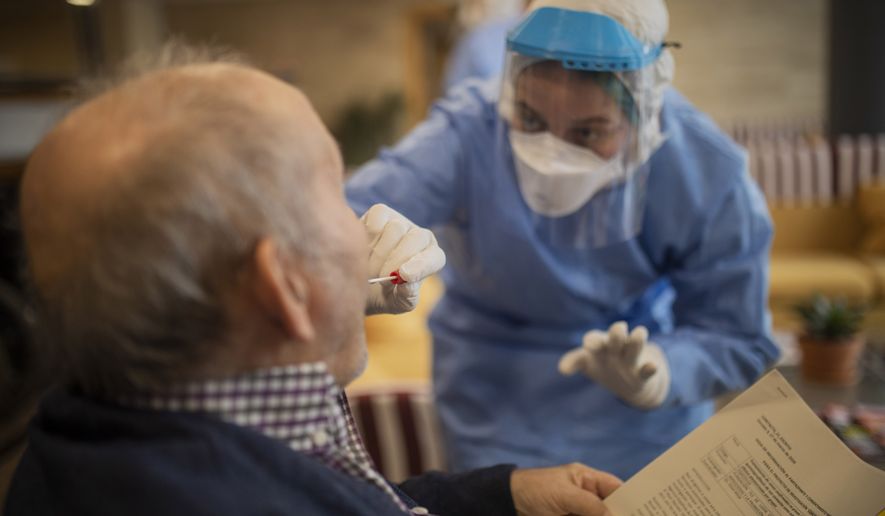It’s hard to watch their countries get ravaged by the coronavirus pandemic from across the ocean, but the top diplomats from Spain and Italy in Washington say the moment is ripe for Europe to step up and do its part.
Italy’s U.S. Ambassador Armando Varricchio and Spanish Ambassador Santiago Cabanas, representing two countries at the current global epicenter of the virus, discussed both the tragedy and the opportunity this week in a Washington briefing.
Both ambassadors said they had been touched by the support and sympathy of the U.S. government and ordinary Americans. Since the start of the outbreak in Italy, Mr. Varricchio said, his embassy has received thousands of messages sympathizing with the devastating situation.
“Now it is more important than ever that our countries act as true friends,” Mr. Varricchio said. “And this is important, not just for managing the crisis now, but also for paving the way for a full recovery once the crisis is over.”
But both envoys said the crisis also showed it was more important than ever that the European Union stand in solidarity with the most stricken countries in its midst.
Mr. Varricchio said at Thursday’s telebriefing organized by the Meridian International Center that Italy was finally beginning to see the first “positive signs” after strict social distancing measures were implemented nationally, which closed non-essential businesses, shut down schools and encouraged citizens to quarantine in their homes.
March has been a brutal month for Italy’s overloaded health care system. A shortage of ventilators and hospital beds forced Italian doctors to focus care on younger, stronger patients, causing hundreds of elderly people and those with underlying conditions to perish daily over a weeklong span in March. As of Wednesday night, Mr. Varricchio said, about 18,000 Italians are currently infected with the virus, 16,000 have fully recovered and 13,000 have died.
Despite discouraging figures, Italians are beginning to approach hospitals for care once again, and more ICU beds are vacant as citizens recover from the virus. Mr. Varricchio called it is a positive sign, revealing that strict measures put in place are working due to cooperation from Italian citizens.
“The only reason these measures are starting to pay off is because the Italian people are, in a way, the very first responders in our society,” Mr. Varricchio said.
In Spain, officials and health care workers are still fighting with “all their strength” to curb the devastating spread of the virus, which has left more than 110,000 infected and 13,000 dead according to Mr. Cabanas. On March 14, Spanish Prime Minister Pedro Sanchez declared a state of emergency, which restricted travel for nearly 47 million Spaniards.
Now more than ever, Mr. Cabanas said, the EU must stand in solidarity to fight this crisis effectively. In Spain, the ambassador said he has been moved by the unprecedented show of support for law enforcement and medical workers. In mid-March, videos of Spaniards clapping and cheering from their apartment balconies for emergency workers went viral on social media, drawing international attention and awe.
Thus far, the EU has activated a “Coronavirus Active Response Initiative” to allocate nearly $3 trillion in an attempt to mobilize the economy, but Mr. Cabanas said these efforts must continue to support a full recovery.
“The truth is, we need to be more reactive, and really act with solidarity within the European Union,” Mr. Cabanas said. “In this case, we are all affected, and we cannot blame anyone for the crisis.”
Mr. Varricchio added there cannot be “national borders” when it comes to fighting the spread of the virus, but instead, teamwork and solidarity in the EU bloc.
The envoys said their governments have been conversing frequently and “efficiently” with the Trump administration on safety measures and policy responses. From the events that have taken place in Italy and Spain, the ambassadors said this could be an opportunity for the American government and American people to learn from their experiences with the spread of the virus.
“I remember that one of the messages we received at the embassy [in Spain] was from one person who said ’think that all these terrible things you’re going through in Spain have a good thing, they’re being useful for us. We’re learning from them,” Mr. Cabanas said. “And it really gave us a little bit of comfort seeing that some people [in the U.S.] are looking at what we are going through and trying to learn from that.”




Please read our comment policy before commenting.